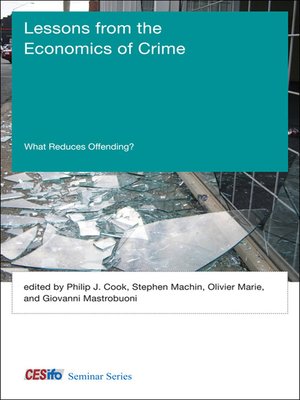Lessons from the Economics of Crime
ebook ∣ What Reduces Offending? · CESifo Seminar
By Philip J. Cook

Sign up to save your library
With an OverDrive account, you can save your favorite libraries for at-a-glance information about availability. Find out more about OverDrive accounts.
Find this title in Libby, the library reading app by OverDrive.



Search for a digital library with this title
Title found at these libraries:
| Library Name | Distance |
|---|---|
| Loading... |
Research from the United States, Europe, and South America demonstrates the usefulness of the tools of economic analysis for the study of crime.
Economists who bring the tools of economic analysis to bear on the study of crime and crime prevention contribute to current debates a normative framework and sophisticated quantitative methods for evaluating policy, the idea of criminal behavior as rational choice, and the connection of individual choices to aggregate outcomes. The contributors to this volume draw on all three of these approaches in their investigations and discuss the policy implications of their findings.
Reporting on research in the United States, Europe, and South America, the chapters discuss such topics as a cost-benefit analysis of additional police hiring, the testing of innovative policy interventions through field experiments, imprisonment and recidivism rates, incentives and disincentives for sports hooliganism ("hooliganomics"), data showing the influence of organized crime on the quality of local politicians, and the (scant) empirical evidence for the effect of immigration on crime. These contributions demonstrate the eclectic approach of economists studying crime as well as their increasing respect for the contributions of other social scientists in this area.
Contributors
Brian Bell, Paolo Buonanno, Philip J. Cook, John J. Donohue III, Jeffrey R. Kling, Jens Ludwig, Stephen Machin, Olivier Marie, Giovanni Mastrobuoni, Sendhil Mullainathan, Aurélie Ouss, Emily Greene Owens, Stefan Pichler, Paolo Pinotti, Mikael Priks, Daniel Römer, Rodrigo R. Soares, Igor Viveiros







